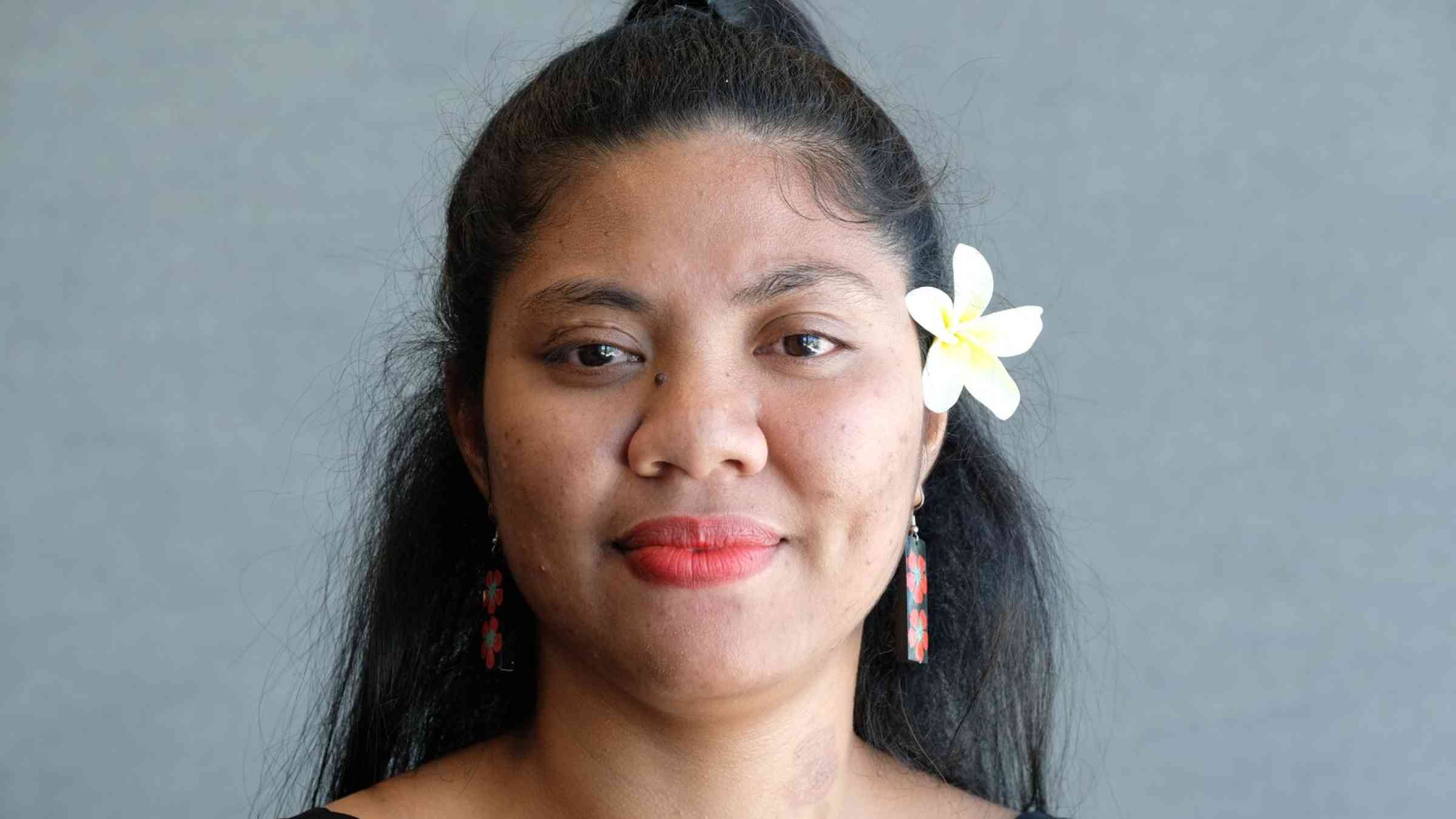Maselina Iuta Fiso: “If we don’t inform or teach those with disabilities how to protect them from disaster, we're leaving them behind”

Maselina leads advocacy campaigns with the Deaf Association of Samoa engaging stakeholders such as the Samoa Meteorological Office, Ministry of the Prime Minister and Cabinet and the National Disaster Management Office to continue to ensure the prioritisation and voices of persons who are Deaf and hard of hearing in Samoa.
“My role is to advocate for the rights of people with disabilities and work with the Deaf community in Samoa to ensure that they are able to participate in all aspects of society” Maselina says. “We do a lot of work with deaf people in rural areas. We are trying to learn better ways to address the specific barriers they experience, and advocate at community and national level for the realisation of their rights as guided by the Convention on the Rights of Persons with Disabilities. .”
Maselina is a Founding Member and Project Officer for the Deaf Association of Samoa. During outreach activities, Maselina leads training and workshops throughout the inhabited islands of Samoa with Deaf and hearing community members related to human rights education, disaster risk reduction and gender-based violence.
She says growing up in Samoa with a disability was extremely challenging. “Growing up, there were a lot of barriers. There was nothing. No access to sign language or education. I couldn’t understand, I couldn’t read and I couldn’t write for many years. It wasn’t until I was 13 that I first learnt sign language, and had the opportunity to read and write, but even now, I continue to work hard to improve my education.
Maselina Iuta Fiso was just a child when the tsunami hit Samoa in 2009. Being deaf she struggled to understand how to respond.
“My friend came to me and said, ‘Come, come, come, let's run! There's a tsunami coming!’
I said ‘it’s finished, the earthquake is finished. I didn’t know why everyone was worried. When I went home, I saw my mom and dad packing and we drove to the other side of the island to Falealupo. We stayed maybe 2 nights, but nothing happened.”
“Then I saw what was happening on the other Island, in the village Laloamanu and it was so scary. my heart was just broken. A lot of people died and there was a lot of damage.”
“When I saw that I was very sad. It made me want to learn from this disaster. That time, on TV when they talked about what was happening, there was no sign language translation. I was asking my parents, please can you tell me what is happening? And they would try to explain about the tsunami. My family has always really supported me to help me understand. We must make sure everyone can understand and stay safe during a tsunami. Now if a tsunami happens we know what to do, and we'll make sure everyone is safe from the tsunami.”
Maselina is a Founding Member & Project Officer for the Deaf Association of Samoa. She leads training & workshops with deaf & hearing community members on human rights education, #DRR & gender-based violence.
Learn more 👉 https://t.co/w6X04qnfrV#IDPD | #IDPWD | @WIN_DRR pic.twitter.com/tSBXhSv9pY— UNDRR (@UNDRR) December 3, 2022
She says her work is to advocate to make sure that people with disabilities are aware of disaster risk, have access to information that they understand and can act on, and have equal opportunities to engage in risk reduction activities.
Her advice to people looking to join the movement to reduce disaster risk: “Don’t be afraid to put yourself out there. When I first started this work, there were days when I was nervous and unsure of myself. Often I am the only person with a disability in the room, and that can be scary. But we need more persons with disabilities in this movement. There is strength in numbers, and together we can ensure that no one is left behind.”
She urges young people with disabilities to get involved in project management and encourages DRR leaders to take time to listen to the perspectives of people with disabilities.. “You should be able to hear their concerns and get them help. We can advise the government to make sure that all persons with disabilities get the help they need during times of disasters.”
Maselina wants others to follow her experience and become advocates for people with disabilities. “Together we are building more understanding for our deaf community.”
She says the pandemic created even more barriers for people with disabilities, but also opportunities. “Most of the deaf community did not have access to information about the pandemic,” she says. “Now, when the government announces emergency messages, we provide sign language translation on TV. It's important for them to know the information about COVID-19 and information on climate disasters like flooding.”
Maselina says there is no one size fits all approach as many deaf people in rural areas cannot understand sign language. “We provide gesture sign language to make sure that they will have the information and for them to understand about emergency orders.”
Over time, people with disabilities have more opportunities to share their experiences about disasters. “It's not easy for the Deaf community, but we want to make sure that there's a way to support them during disaster warnings.”
As people consider their career in disaster risk reduction, Maselina warns there will be setbacks. “Sometimes you will be challenged,” she says. “Some will ignore us, but don't give up; keep doing it.”
Maselina is a member of the National Disability Reference Group for the UN Joint Program on Social Protection, a member of the National Steering Committee for the Samoa Shifting the Power Coalition Project, and the Pacific Regional Winner for the Commonwealth Youth Award 2021.